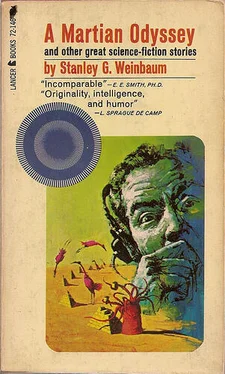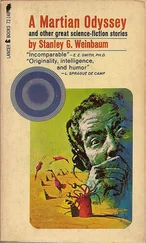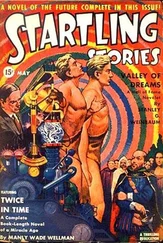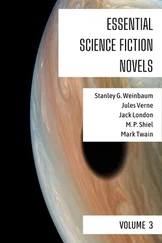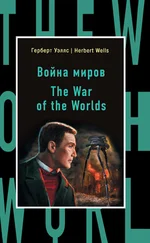Stanley Weinbaum - The Worlds of If
Здесь есть возможность читать онлайн «Stanley Weinbaum - The Worlds of If» весь текст электронной книги совершенно бесплатно (целиком полную версию без сокращений). В некоторых случаях можно слушать аудио, скачать через торрент в формате fb2 и присутствует краткое содержание. Жанр: Фантастика и фэнтези, на английском языке. Описание произведения, (предисловие) а так же отзывы посетителей доступны на портале библиотеки ЛибКат.
- Название:The Worlds of If
- Автор:
- Жанр:
- Год:неизвестен
- ISBN:нет данных
- Рейтинг книги:5 / 5. Голосов: 1
-
Избранное:Добавить в избранное
- Отзывы:
-
Ваша оценка:
- 100
- 1
- 2
- 3
- 4
- 5
The Worlds of If: краткое содержание, описание и аннотация
Предлагаем к чтению аннотацию, описание, краткое содержание или предисловие (зависит от того, что написал сам автор книги «The Worlds of If»). Если вы не нашли необходимую информацию о книге — напишите в комментариях, мы постараемся отыскать её.
The Worlds of If — читать онлайн бесплатно полную книгу (весь текст) целиком
Ниже представлен текст книги, разбитый по страницам. Система сохранения места последней прочитанной страницы, позволяет с удобством читать онлайн бесплатно книгу «The Worlds of If», без необходимости каждый раз заново искать на чём Вы остановились. Поставьте закладку, и сможете в любой момент перейти на страницу, на которой закончили чтение.
Интервал:
Закладка:
"Dixon," he concluded, "you have no conception whatever of time. None whatever."
The conversation with van Manderpootz recurred to me. I was impelled to ask, "And have you, sir?"
"I have," he said grimly. "I most assuredly have. Time," he said oracularly, "is money."
You can't argue with a viewpoint like that.
But those aspersions of his rankled, especially that about the Baikal . Tardy I might be, but it was hardly conceivable that my presence aboard the rocket could have averted the catastrophe. It irritated me; in a way, it made me responsible for the deaths of those unrescued hundreds among the passengers and crew, and I didn't like the thought.
Of course, if they'd waited an extra five minutes for me, or if I'd been on time and they'd left on schedule instead of five minutes late, or if — if !
If! The word called up van Manderpootz and his subjunctivisor — the worlds of "if," the weird, unreal worlds that existed beside reality, neither past nor future, but contemporary, yet extemporal. Somewhere among their ghostly infinities existed one that represented the world that would have been had I made the liner. I had only to call up Haskel van Manderpootz, make an appointment, and then — find out.
Yet it wasn't an easy decision. Suppose — just suppose that I found myself responsible — not legally responsible, certainly; there'd be no question of criminal negligence, or anything of that sort — not even morally responsible, because I couldn't possibly have anticipated that my presence or absence could weigh so heavily in the scales of life and death, nor could I have known in which direction the scales would tip. Just — responsible; that was all. Yet I hated to find out.
I hated equally not finding out. Uncertainty has its pangs too, quite as painful as those of remorse. It might be less nerve-racking to know myself responsible than to wonder, to waste thoughts in vain doubts and futile reproaches. So I seized the visiphone, dialed the number of the University, and at length gazed on the broad, humorous, intelligent features of van Manderpootz, dragged from a morning lecture by my call.
* * * * *
I was all but prompt for the appointment the following evening, and might actually have been on time but for an unreasonable traffic officer who insisted on booking me for speeding. At any rate, van Manderpootz was impressed.
"Well!" he rumbled. "I almost missed you, Dixon. I was just going over to the club, since I didn't expect you for an hour. You're only ten minutes late."
I ignored this. "Professor, I want to use your — uh — your subjunctivisor."
"Eh? Oh, yes. You're lucky, then. I was just about to dismantle it."
"Dismantle it! Why?"
"It has served its purpose. It has given birth to an idea far more important than itself. I shall need the space it occupies."
"But what is the idea, if it's not too presumptuous of me to ask?"
"It is not too presumptuous. You and the world which awaits it so eagerly may both know, but you hear it from the lips of the author. It is nothing less than the autobiography of van Manderpootz!" He paused impressively.
I gaped. "Your autobiography?"
"Yes. The world, though perhaps unaware, is crying for it. I shall detail my life, my work. I shall reveal myself as the man responsible for the three years' duration of the Pacific War of 2004."
"You?"
"None other. Had I not been a loyal Netherlands subject at that time, and therefore neutral, the forces of Asia would have been crushed in three months instead of three years. The subjunctivisor tells me so; I would have invented a calculator to forecast the chances of every engagement; van Manderpootz would have removed the hit or miss element in the conduct of war." He frowned solemnly. "There is my idea. The autobiography of van Manderpootz. What do you think of it?"
I recovered my thoughts. "It's — uh — it's colossal!" I said vehemently. "I'll buy a copy myself. Several copies. I'll send 'em to my friends."
"I," said van Manderpootz expansively, "shall autograph your copy for you. It will be priceless. I shall write in some fitting phrase, perhaps something like Magnificus sed non superbus . 'Great but not proud!' That well described van Manderpootz, who despite his greatness is simple, modest, and unassuming. Don't you agree?"
"Perfectly! A very apt description of you. But — couldn't I see your subjunctivisor before it's dismantled to make way for the greater work?"
"Ah! You wish to find out something?"
"Yes, professor. Do you remember the Baikal disaster of a week or two ago? I was to have taken that liner to Moscow. I just missed it." I related the circumstances.
"Humph!" he grunted. "You wish to discover what would have happened had you caught it, eh? Well, I see several possibilities. Among the world of 'if' is the one that would have been real if you had been on time, the one that depended on the vessel waiting for your actual arrival, and the one that hung on your arriving within the five minutes they actually waited. In which are you interested?"
"Oh — the last one." That seemed the likeliest. After all, it was too much to expect that Dixon Wells could ever be on time, and as to the second possibility — well, they hadn't waited for me, and that in a way removed the weight of responsibility.
"Come on," rumbled van Manderpootz. I followed him across to the Physics Building and into his littered laboratory. The device still stood on the table and I took my place before it, staring at the screen of the Horsten psychomat. The clouds wavered and shifted as I sought to impress my memories on their suggestive shapes, to read into them some picture of that vanished morning.
Then I had it. I made out the vista from the Staten Bridge, and was speeding across the giant span toward the airport. I waved a signal to van Manderpootz, the thing clicked, and the subjunctivisor was on.
The grassless clay of the field appeared. It is a curious thing about the psychomat that you see only through the eyes of your image on the screen. It lends a strange reality to the working of the toy; I suppose a sort of self-hypnosis is partly responsible.
I was rushing over the ground toward the glittering, silver-winged projectile that was the Baikal . A glowering officer waved me on, and I dashed up the slant of the gangplank and into the ship; the port dropped and I heard a long "Whew!" of relief.
"Sit down!" barked the officer, gesturing toward an unoccupied seat. I fell into it; the ship quivered under the thrust of the catapult, grated harshly into motion, and then was flung bodily into the air. The blasts roared instantly, then settled to a more muffled throbbing, and I watched Staten Island drop down and slide back beneath me. The giant rocket was under way.
"Whew!" I breathed again. "Made it!" I caught an amused glance from my right. I was in an aisle seat; there was no one to my left, so I turned to the eyes that had flashed, glanced, and froze staring.
It was a girl. Perhaps she wasn't actually as lovely as she looked to me; after all, I was seeing her through the half-visionary screen of a psychomat. I've told myself since that she couldn't have been as pretty as she seemed, that it was due to my own imagination filling in the details. I don't know; I remember only that I stared at curiously lovely silver-blue eyes and velvety brown hair, and a small amused mouth, and an impudent nose. I kept staring until she flushed.
"I'm sorry," I said quickly. "I — was startled."
There's a friendly atmosphere aboard a trans-oceanic rocket. The passengers are forced into a crowded intimacy for anywhere from seven to twelve hours, and there isn't much room for moving about. Generally, one strikes up an acquaintance with his neighbors; introductions aren't at all necessary, and the custom is simply to speak to anybody you choose — something like an all-day trip on the railroad trains of the last century, I suppose. You make friends for the duration of the journey, and then, nine times out of ten, you never hear of your traveling companions again.
Читать дальшеИнтервал:
Закладка:
Похожие книги на «The Worlds of If»
Представляем Вашему вниманию похожие книги на «The Worlds of If» списком для выбора. Мы отобрали схожую по названию и смыслу литературу в надежде предоставить читателям больше вариантов отыскать новые, интересные, ещё непрочитанные произведения.
Обсуждение, отзывы о книге «The Worlds of If» и просто собственные мнения читателей. Оставьте ваши комментарии, напишите, что Вы думаете о произведении, его смысле или главных героях. Укажите что конкретно понравилось, а что нет, и почему Вы так считаете.
